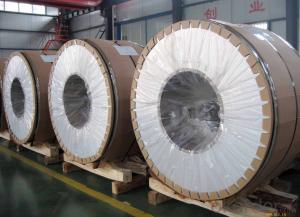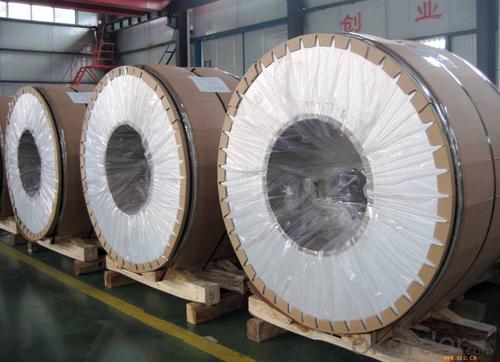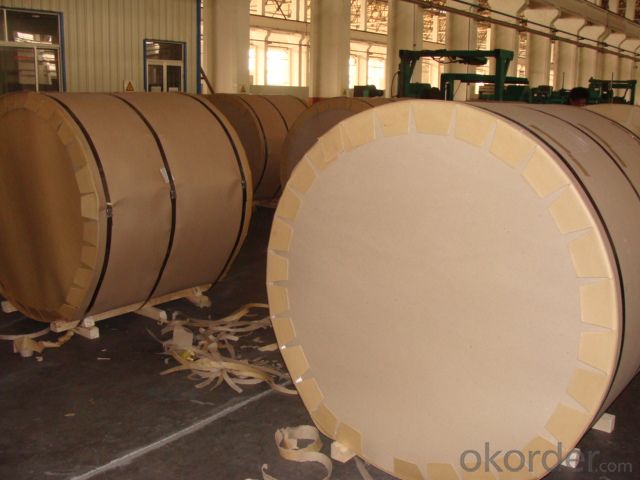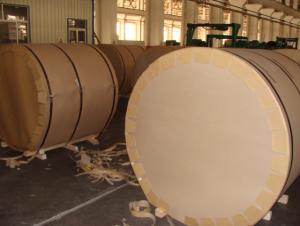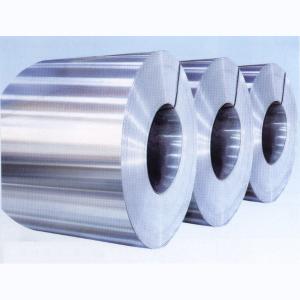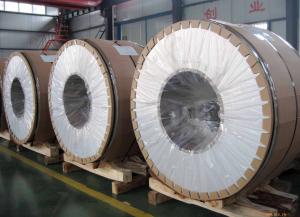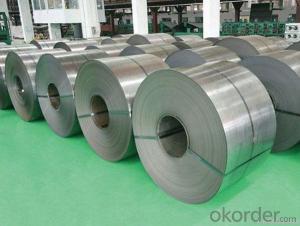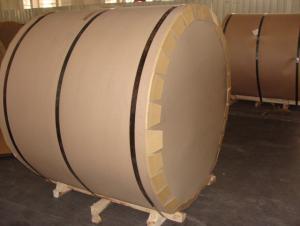No-Mar Mill-Finished Aluminum Coils XXX
- Loading Port:
- China Main Port
- Payment Terms:
- TT OR LC
- Min Order Qty:
- -
- Supply Capability:
- -
OKorder Service Pledge
OKorder Financial Service
You Might Also Like
Specifications
Aluminum Coil
1.Manfacture
2.Woodenbox package
3.Material is from big aluminum factory
High Quality and Factory Price Aluminum Coil
Specifications
Grade
| 1000 Series: 1050 1060 1070 1100 1200 1235 etc. 3000 Series: 3003 3004 3005 3104 3105 3A21 etc. 5000 Series: 5005 5052 5083 5086 5154 5182 5251 5754 etc. 6000 Series: 6061 6063 6082 6A02 etc. 8000 Series: 8006 8011 8079 etc. |
Thickness | 0.05~10mm |
Width | <1600mm |
Color | Metallic, Solid, RAL or by customer requirements |
Coating paint: | PVDF(Polyvinylidene Fluoride), PE(Polyester ) |
Coating thickness | as per customer’s request |
Gloss | 10-90%(EN ISO-2813:1994) |
Total coating thick | Polyester18~27micron(EN ISO-2360:1995) PVDF27 ~35micron(EN ISO-2360:1995) |
Coating hardness | 2H |
Protective film | PVC film, Colorless transparent or White-black |
Adhesion | 5B (EN ISO-2409:1994) |
Impact resistance | No cracking and peeling (A.S.T.M D2794-1993) |
Flexibility (T-bend) | 0T- 2T |
Temper | H16, H18, H24, H26, H26 |
Certification | ISO9001:2000, CE, SGS |
Coil's standard diameter | 1100mm |
Inner Diameter | 405mm/505mm |
Coil's standard weight | 2000kgs |
Payment | L/C ,T/T |
- Q: How do aluminum coils contribute to recyclability in the construction industry?
- The inherent properties and characteristics of aluminum coils play a vital role in improving recyclability in the construction industry. To begin with, aluminum is a material that can be recycled repeatedly without losing its quality or physical properties, making aluminum coils an eco-friendly and sustainable option for construction projects. The recyclability of aluminum coils aids in reducing the environmental impact associated with the construction industry. By opting for aluminum coils, construction companies can contribute to the preservation of natural resources and the reduction of energy consumption. Recycling aluminum requires much less energy compared to producing it from raw materials, resulting in a significant decrease in greenhouse gas emissions and carbon footprint. Furthermore, the use of aluminum coils in construction simplifies the dismantling and deconstruction processes, making it easier to separate the aluminum components from other materials. This efficient separation allows for effective recycling of aluminum coils, ensuring that they can be transformed into new products or materials. Moreover, aluminum's durability and resistance to corrosion make it a suitable choice for construction applications. Its long lifespan reduces the need for frequent replacements, thereby minimizing waste generation and the consumption of raw materials. When the time comes to replace or renovate a building, the aluminum coils can be effortlessly collected, recycled, and reintroduced into the manufacturing cycle, completing the material's lifecycle. In conclusion, aluminum coils play a significant role in enhancing recyclability in the construction industry. Their high recyclability, low energy requirements for recycling, and ease of separation during deconstruction make them an environmentally friendly choice. By utilizing aluminum coils, the construction industry can promote sustainability, reduce waste generation, and conserve natural resources, ultimately leading to a greener and more circular construction sector.
- Q: Explain how aluminum coils function to shield against electromagnetic interference.
- <p>Aluminum coils protect against electromagnetic interference (EMI) through a process known as electromagnetic shielding. Aluminum, being a conductive material, can reflect and absorb EMI, preventing it from penetrating the protected area. When an aluminum coil is used as a shield, it creates an electric field that interacts with the EMI, either reflecting the interference back or absorbing it, thus reducing its impact on sensitive electronic equipment. The high conductivity of aluminum also allows it to distribute the EMI evenly across its surface, minimizing the effect of any single point of entry. This shielding is crucial in various applications, such as in electronic devices and communication systems, to ensure reliable performance and data integrity.</p>
- Q: What is the profit of aluminium coil gate?
- Who will tell you? It depends on how much you sell
- Q: Explain the distinction between standard and non-standard aluminum coils, focusing on their specifications and applications.
- <p>A standard aluminum coil is manufactured according to specific industry standards, such as thickness, width, and alloy composition, making it suitable for common applications like construction, automotive, and packaging. Non-standard aluminum coils, on the other hand, are tailored to meet unique customer requirements, featuring customized dimensions, alloys, or finishes that deviate from the norm. These are often used in specialized industries or for specific projects where standard coils do not meet the necessary specifications.</p>
- Q: Is there any way aluminum can affect you if its absorbed into your body either by digestion, through an open cut, or even through breathing it in?Most likely inhaling it would surely affect you, but what about the other two?
- Aluminium can accumulate in the brain possibly causing alzheimers. If you inhaled it it would poison you and damage your lungs, if you got it in your body it would damage your skin, possibly cause an infection and the cut might not heal. Aluminium is a solid so how could you accidently get it in your body unless you have been melting it etc? If it wasn't solid it would burn you if you got it on your skin. You can only inhale vapours not a metal. If you ate it then it would probably damage or clog up your insides otherwise just pass out in a stool, depends how much you ate. People eat from aluminium and touch it every day so it is not dangerous to be in contact with.
- Q: How are aluminum coils protected against mechanical damage?
- Aluminum coils are protected against mechanical damage through several methods. One of the primary ways is by applying a protective coating or finish to the surface of the coil. This coating acts as a barrier between the coil and any potential sources of mechanical damage, such as impact or abrasion. The coating can be a paint or a specialized coating designed specifically for aluminum, which provides enhanced durability and resistance to scratching or denting. In addition to the protective coating, aluminum coils may also be reinforced with a layer of laminate or film. This additional layer adds an extra level of protection against mechanical damage and can help prevent dents or scratches from occurring. The laminate or film can be applied during the manufacturing process or added as a separate step after the coil has been produced. Furthermore, aluminum coils may be wrapped or packaged in protective materials such as plastic or foam to minimize the risk of mechanical damage during transportation or storage. These protective wrappings help cushion the coil and provide a barrier against impacts or heavy objects that could potentially cause damage. Overall, the combination of protective coatings, laminates, and packaging materials helps to ensure that aluminum coils are adequately protected against mechanical damage. These measures help to maintain the integrity and quality of the coils, allowing them to perform effectively in various applications.
- Q: How are aluminum coils protected against galvanic corrosion?
- Aluminum coils are protected against galvanic corrosion through a combination of surface treatments and protective coatings. One common method is the application of a thin layer of anodization on the aluminum surface. Anodization involves electrolytically treating the aluminum with an acid solution, which creates a protective oxide layer on the surface. This oxide layer acts as a barrier, preventing the direct contact between the aluminum and other metals that may cause galvanic corrosion. Another method is the use of a protective coating, such as a polymer or paint, on the aluminum coils. These coatings provide a physical barrier between the aluminum and the environment, preventing the exposure of the metal to corrosive elements. The coatings are carefully selected to have good adhesion to the aluminum surface and excellent resistance to corrosion. In addition to surface treatments and coatings, proper design and material selection also play a crucial role in protecting aluminum coils against galvanic corrosion. By ensuring that dissimilar metals are not in direct contact and using compatible materials, the risk of galvanic corrosion can be minimized. This can be achieved through the use of isolation materials, such as gaskets or insulating tapes, to separate the aluminum coil from other metals in contact. Regular maintenance and cleaning also contribute to the protection against galvanic corrosion. It is important to remove any accumulated dirt, debris, or corrosive substances from the aluminum coils to prevent the formation of localized corrosion cells. Overall, a combination of surface treatments, protective coatings, proper design, and regular maintenance are essential in protecting aluminum coils against galvanic corrosion. These measures help to extend the lifespan and maintain the performance of the coils in various applications.
- Q: This question asks for the distinctions between two forms of aluminum used in various industries: coils and sheets.
- <p>Aluminum coil and aluminum sheet are both flat aluminum products but differ in form and usage. Aluminum coil is a long, continuous roll of aluminum that can be easily cut to length and is often used for manufacturing processes like stamping, bending, and forming. It's ideal for applications requiring a consistent and uniform supply of material. On the other hand, aluminum sheet is a flat, rectangular piece of aluminum with a specific thickness, width, and length. It is used for applications where a single piece of material is needed, such as in construction, signage, and decorative purposes. The main difference lies in the form factor and the way they are used in manufacturing and construction processes.</p>
- Q: How are aluminum coils inspected for defects?
- Aluminum coils are inspected for defects through various methods to ensure their quality and performance. One common method is visual inspection, where trained inspectors carefully examine the surface of the coil for any visible defects such as scratches, dents, or other damage. This type of inspection is usually done by human inspectors using proper lighting and magnifying tools to detect even the smallest defects. In addition to visual inspection, advanced technologies such as automated optical inspection (AOI) systems are used to thoroughly inspect the coils. These systems use cameras and image processing software to detect and analyze any abnormalities on the surface of the coil. AOI systems can identify defects such as cracks, pits, or surface irregularities that may not be visible to the naked eye. Another method used to inspect aluminum coils is ultrasonic testing. This non-destructive testing technique involves sending ultrasonic waves through the coil and analyzing the echoes that bounce back. By measuring the time it takes for the ultrasonic waves to travel through the coil and the amplitude of the echoes, defects such as internal cracks, voids, or inclusions can be identified. Furthermore, eddy current testing is another commonly used method for defect inspection in aluminum coils. This technique involves passing an alternating current through a coil and measuring the changes in the electromagnetic field caused by any defects in the material. Changes in the field can indicate the presence of cracks, voids, or other anomalies. Overall, a combination of visual inspection, automated optical inspection systems, ultrasonic testing, and eddy current testing is typically employed to thoroughly inspect aluminum coils for defects. These inspection methods help ensure that the coils meet the required quality standards and are free from any defects that could impact their performance or durability.
- Q: Will the surface of the aluminum sheet touch the water?Aluminum rolls weighing 3.463 tons,.35mm thick, 900mm wide, very tight coil, is a mechanical binding. Water does not penetrate the surface of aluminium rolls
- It depends on how tight, very tight, aluminum will be together, that will certainly not water
Send your message to us
No-Mar Mill-Finished Aluminum Coils XXX
- Loading Port:
- China Main Port
- Payment Terms:
- TT OR LC
- Min Order Qty:
- -
- Supply Capability:
- -
OKorder Service Pledge
OKorder Financial Service
Similar products
Hot products
Hot Searches
Related keywords
